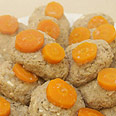
Fish prices rise ahead of Passover
Some 1,100 tons of carp, 70 million eggs expected to be sold before holiday, Agriculture Ministry says
According to the figures, the marketing of fish is expected to see a 17% rise compared to the same period last year. This holiday's demand is expected to stand at 2,800 tons of fish, compared to some 2,400 tons last year.
The marketing of eggs, however, is not expected to increase this year. According to Egg Board estimates, some 70 million eggs will be sold, and 10% of them will be imported from Turkey.
And yet, a 10% rise is still expected in the consumption of eggs – as in previous years. In an average month every Israeli consumes about 20 eggs, while in the month of Passover the consumption goes up to 22 eggs per person. In total, an Israeli consumes about 240 eggs a year.
So how much will carp cost?
Throughout the year Israelis prefer to eat tilapia, while on Passover their favorite fish is carp, which is used as the raw material for gefilte fish.
The recommended retail selling price for tilapia will range this holiday between NIS 25-28 ($7-8) per kilogram, the recommended price for carp ranges between NIS 22-25 ($6-7) per kilogram, and the recommended price for grey mullet ranges between NIS 30-38 ($8.5-11), slightly higher than last year's price.
An average Israeli consumes some 800 grams of fish a month. During the month of Passover the consumption reaches 1,400 grams per person – a 75% rise compared to the rest of the year. The consumption of carp doubles. The average annual consumption per capita stands at 10 kilograms.
Some 1,100 tons of carp, 800 tons of tilapia and 300 tons of grey mullet are expected to be sold during Passover this year. In addition, some 600 tons of drum fish, silver carp, sea bass, grass carp and red tilapia will also be marketed this Passover, as well as 20 tons of fresh fillet of different types of fish – including grey mullet, tilapia, red tilapia, drum fish, trout and carp.
The local consumption per capita in Israel is very low compared to the consumption in other countries. However, it did not change during the recession, and this could be ascribed to the healthy benefits of fish.
In Israel the average consumption per capita is about 10 kilograms (22 pounds) a year, compared to the Mediterranean countries which consume 20-40 kilograms, Japan – 60 kilograms, and the Americans – 6-7 kilograms per capita a year.
According to Agriculture Ministry figures, Israelis consumed some 74,000 tons of fish in 2010 – 24,000 tons manufactured in Israel and some 50,000 tons imported from abroad (mostly frozen).
The industry's local production comes from three sources: Fish breeding – some 19,300 tons, fishing – 2,500 tons, and maritime agriculture – 2,200 tons.
Most Israelis prefer tilapia fish (some 8,000 tons a year), followed by carp (6,500 tons), sea bream (4,000 tons), grey mullet (2,500 tons), trout (500 tons), sardines (400 tons) and sea bass (300 tons).
Israelis prefer L, XL eggs
Israelis have preferences when it comes to eggs too, favoring regular eggs in large and extra large sizes. It seems that 98% of Israelis' egg consumption is of regular eggs, and only 2% of free-range eggs and organic eggs.
The price of a 12-egg carton is supervised and ranges between NIS 12.75 ($3.70) for XL eggs and NIS 10.40 ($3) for medium eggs. The price of free-range and organic eggs can reach NIS 20 ($5.8).
Some 1.8 billion eggs are laid in Israel every year, coming from 3,000 different breeders – mostly in the north. The local consumption per capita is relatively high compared to other countries: Israel is ranked fourth in the world with an average of 340 eggs per capita a year. Japan tops the list with 350 eggs per capita, followed by France and the United States.
- Follow Ynetnews on Facebook










